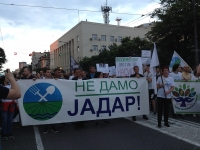Rio Tinto Trying to Restart Canceled Lithium Mine in Serbia

Photo: Emilija Knezevic Used under Creative Commons license.
Rio Tinto Zinc is quietly trying to restart a $2.4 billion plan to dig for lithium in the Jadar region of Serbia two years after the original mining permit was canceled in response to a massive popular uprising in 2022.
Demand for lithium - a critical component of batteries for electric vehicles and mobile devices – has skyrocketed around the world in recent years, attracting interest from many major mining companies. Rio Tinto, which has been conducting exploratory drilling in the Jadar region since 2011, obtained a permit for a major mine from the Serbian government in 2017. (The company also paid $825 million to buy up the Rincon lithium project in Argentina in 2022.)
Local residents say that the company deceived them. "They were talking about a small mine then, 20 hectares, and that we would never even know it was here," Marijana Petkovic, a local teacher, told the Guardian newspaper. "We were idiots. We weren’t paying attention."
Opposition to the mine grew after the real scale of the mine – 850 hectares with tunnels 650 meters deep – became obvious. It is projected to produce 2.3 million tonnes of lithium carbonate over the next 40 years as well as 160,000 tonnes of boric acid annually, making it one of the top 10 lithium producers in the world.
Experts say that the mine will profoundly impact the local environment. "It will be necessary to draw large amounts of water for the needs of the mine, which could lead to droughts during the summer and floods during the rainy periods," Miroslav Mijatović, the head of the Podrinje Anti-Corruption Team, told Danas newspaper.
Tension boiled over after the Serbian parliament passed a new law in 2021 that allowed environmentally damaging mining projects to proceed, that would have allowed the Jadar project to go ahead. (The law also benefited four major copper mines operated by Zijin).
Activists groups like the Alliance of Environmental Organisations of Serbia, Ecological Uprising and Kreni-Promeni organized thousands of Serbians to protest in the streets of Belgrade and Loznica in late 2021, and promised to bring the country to a standstill, if the law was not revoked, and the mine canceled.
“I am against a mine that will destroy several thousand hectares of fertile land,” Ratko Ristić, the dean of the Faculty of Forestry of the University of Belgrade, said at one of the protests. "Did our people deserve - after 30 years of wars and hundreds of thousands of refugees - that a foreign company pursues business interests and displaces people from a tame valley, where every inch is cultivated and schools are open?”
In December 2021, the government backed down and suspended the two laws. Local authorities also canceled Rio Tinto’s permit.
But Rio Tinto has not gone away. Instead it has quietly bought up some €1.2 million worth of land in the area in the last couple of years, according to the Balkan Investigative Reporting Network, and filed nine lawsuits against the government of Serbia, according to Nova news.
“The only thing I would say today is we haven’t given up," Jakob Stausholm, CEO told an investor briefing in Sydney. “We need to figure out how to go about it.”
“Rio Tinto buys people off with offers of cash, and now, in a genius marketing move, they act like a humanitarian organization that invests in local crafts,” Jovana Amidzic of Mars sa Drine (the name means Get off the Drina) told Balkan Insight.
Recently, the Serbian government indicated that it would be open to a new deal with Rio Tinto. “No disaster will happen there,” Aleksandar Vučić, Serbia’s president, told a TV chat show in January: “I’m dying with laughter when I hear that people are protesting over it. They are protesting down there, in western Serbia, over Rio Tinto and they say it will be a disaster. No, it will not.”
So activist groups like Mars sa Drine are campaigning for a national referendum on the mine, under a promise made by the Serbian government to quell the 2021 protests, that has yet to be held.



